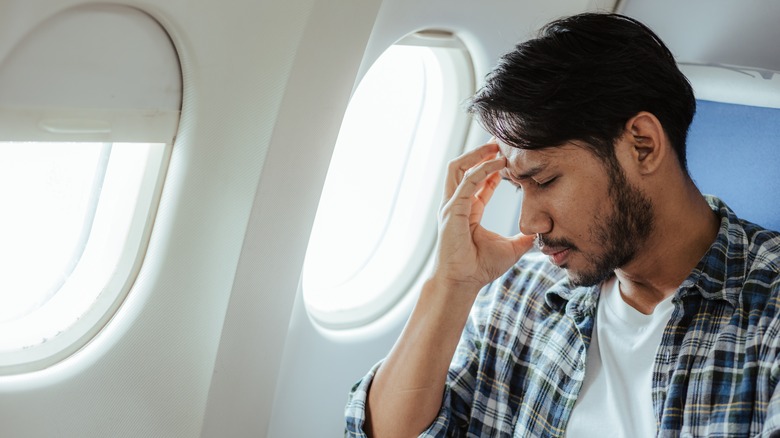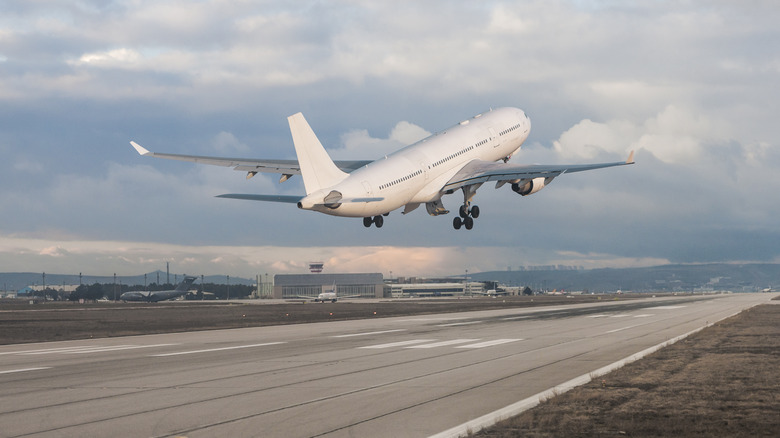A Doctor Gave Us Simple Tips To Make Flying With Vertigo Less Miserable
As you board a flight on your way to explore a new destination, it can be a moment filled with anticipation and excitement about the adventure ahead. For many people, however, this moment can also be tinged with anxiety about the way that flying may affect your health, particularly for those who suffer from vertigo. The experience of becoming airborne can wreak havoc on the well-being of a person who suffers from this condition. Can anything be done to alleviate these uncomfortable symptoms? In an exclusive interview with Explore, Dr. Jason Singh, Chief Medical Officer and Physician at One Oak Medical, suggests different ways travelers can lessen the symptoms of vertigo while flying.
Experiencing vertigo can make you dizzy and feel like you're losing your balance. There are many reasons why people become prone to this condition, such as when they're recovering from a recent virus, injury, or surgery. Vertigo can also be triggered as a side effect of some medications. Air travel can exaggerate these effects, and some people may even be hesitant about the journey, particularly as they consider how to survive a long-haul flight. In his practice in Aldie, Virginia, Dr. Singh focuses on helping his patients improve their lives through good health. He also engages with the community by providing his expertise on topics relevant to healthy living. Here are several of his recommendations to travelers with vertigo on how to stay comfortable while flying.
Changes in air pressure can trigger vertigo
The semicircular canals inside the inner ear sense feelings of movement, whether it's side to side, up and down, or a tilting motion. This sensory information is a part of the body's vestibular system, "which is responsible for maintaining balance and spatial orientation," Dr. Singh explains. "Vertigo is typically due to disturbances in the vestibular system." When asked about how flying can affect a person's symptoms, his answer is clear. "Flying can certainly make vertigo worse."
Dr. Singh describes how a flight can trigger these symptoms. "During air travel, as the aircraft ascends and descends, this can cause changes in air pressure. [The] air pressure changes can result in imbalances in the semicircular canals of the inner ear which triggers vertigo sensation," he explains. While these changes are mildly uncomfortable for most travelers, they can become almost unbearable for a person who is prone to this condition.
Dr. Singh points out that it's not only the standard ascent and descent of a plane that can be an issue, but other moments during a flight can cause problems as well. It's troublesome if the plane encounters any rough air during the trip. He says, "Sudden movements experienced during turbulence can disrupt the vestibular system, which can also cause vertigo." While it's possible to check the turbulence forecast before your flight, these uneven patches can still be unpredictable, making it difficult for travelers to anticipate how often their symptoms will appear.
Stay hydrated and sit by the window
The good news is that Dr. Singh has developed several strategies for travelers who suffer from vertigo. "I have patients who tend to be sensitive to flying which triggers their vertigo," he says, "so I typically will recommend an antihistamine or anticholinergic to take prophylactically." Taking these medications before the flight can lessen the symptoms they experience once on board the plane. He also recommends ginger, because of its anti-nausea and anti-vertigo benefits. Ginger can be taken as a supplement, or simply drinking a ginger ale is helpful as well. Dr. Singh also emphasizes how important it is to stay hydrated before you board the plane as well as during the flight.
He points out that your seat on the plane makes a difference as well. "Seat selection is important... choose a seat over the wing where turbulence is less [pronounced], or a window seat, which can provide visual cues to help your brain better interpret motion," he suggests. During the flight, "consider minimizing head movements which can disrupt the vestibular system," he adds. It's encouraging to know that travelers who suffer from vertigo can follow these tips from Dr. Singh to make flights more enjoyable. You can also try booking flights at the time of day when turbulence is less of a problem. Understanding the causes of vertigo and how to alleviate the symptoms will keep this condition from standing in the way of your next adventure.


